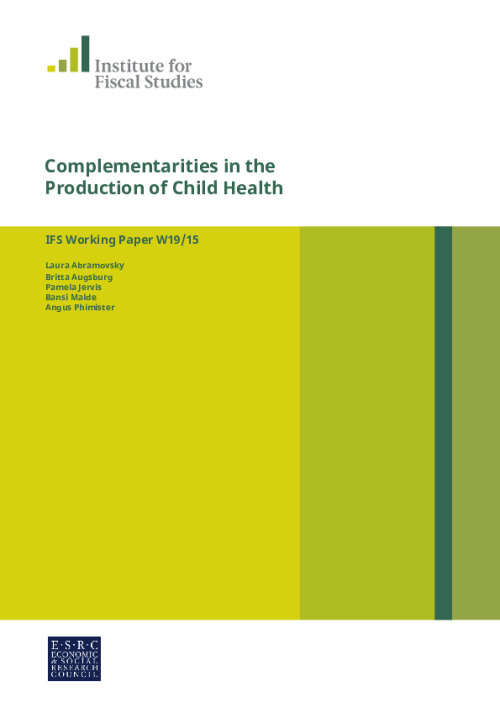Downloads

WP201915.pdf
PDF | 662.37 KB
This paper estimates flexible child health production functions to investigate whether better water, sanitation and hygiene (WASH) practices make nutrition intake more productive for children aged 6-24 months. Using cohort data, with detailed information on nutrition intake and WASH investments, and a control function approach to account for endogeneity of inputs, we show that better WASH increases the productivity of protein and calories in the formation of child health using as proxies child height and weight. We also uncover heterogeneity in the productivity of these inputs by child gender: nutritional intake is found to be more productive for boys, and WASH investments more productive for girls. Further analysis indicates that this is not driven by differential parental invest-ments by child gender. Although the study sample are children born in the early 1980s they faced similar nutritional and WASH conditions as those faced by children currently living in poor households in low-income settings.
Authors

Research Fellow Institute for Fiscal Studies
Laura is a Research Fellow at IFS. Her current work focuses on tax and social protection policy and programme evaluation in developing countries.

Research Fellow University of Kent
Bansi is a Research Fellow of the IFS, a Senior Lecturer of Economics at the University of Kent and also a Fellow at the Global Labor Organisation.

Associate Director
Britta is an IFS Associate Director, Associate Staff at the Department of Economics at the UC and Researcher at NIHR Obesity Policy Research Unit.

Research Associate University of Chile
Pamela is a Research Associate of the IFS and Assistant Professor of Economics at the Department of Industrial Engineering at the University of Chile.

Angus Phimister
Working Paper details
- DOI
- 10.1920/wp.ifs.2019.1519
- Publisher
- The IFS
Suggested citation
Abramovsky, L et al. (2019). Complementarities in the Production of Child Health. London: The IFS. Available at: https://ifs.org.uk/publications/complementarities-production-child-health (accessed: 6 May 2024).
Related documents
Online Appendix
PDF | 276.67 KB
More from IFS
Understand this issue

Conservative Party Conference: Can the next government afford the NHS?

Disability, illness and pain are real problems for the entire economy
28 August 2023

Retirement is not always a choice that workers can afford to make
6 November 2023
Policy analysis

The past and future of NHS waiting lists in England
29 February 2024

Recent trends in and the outlook for health-related benefits
19 April 2024

4.2 million working-age people now claiming health-related benefits, could rise by 30% by the end of the decade
19 April 2024
Academic research

Longer-term impacts of the COVID-19 pandemic on the dietary purchasing choices of British households
4 April 2024

The consequences of miscarriage on parental investments
22 March 2024

The menopause "penalty"
18 March 2024